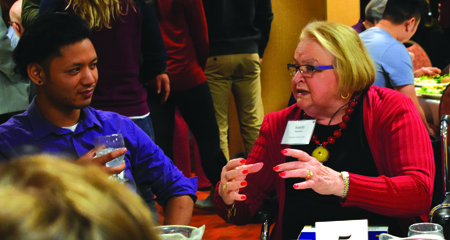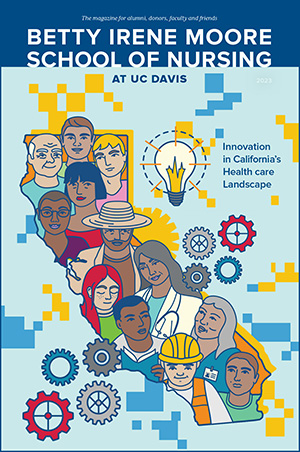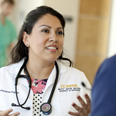Innovative course offers unique leadership perspectives

Former Sacramento County Supervisor Sandy Smoley, left, provides leadership insight to master’s-degree leadership student Romeo Rivera.
One of the core principles upon which the Betty Irene Moore School of Nursing at UC Davis was founded is that all health professionals must have leadership skills in order to create the change needed in health care. To achieve that goal, graduate students in all five programs take a leadership course during their first year of study.
“Whether our students lead quality improvement efforts on our units in the hospital setting or drive change in the community, we recognize that principles of leadership cross many boundaries of health care,” explained Assistant Clinical Professor Susan Adams, one of the course instructors. “This coursework marks an important milestone in their education and arms them with the knowledge to view health care policy through the lens of the people and communities they impact.”
The interprofessional course includes 20 students from the UC Davis School of Medicine. It offers a critical examination of leadership from a variety of theoretical and philosophical perspectives and focuses on specific challenges in health care and leadership at patient, organizational and policy levels.
“To have a profound impact on the future of healthcare, every student at the Betty Irene Moore School of Nursing needs to understand that leadership skills, along with clinical and research skills, are fundamental to modeling the way and inspiring others over the arc of a career.”
-Philippe Goldin, assistant professor and leadership course instructor
“I believe this course illustrated the importance of letting the team determine what kind of leader is needed, rather than a leader arriving among the team with his or her preferred leadership style,” said Krista Greaves, a second-year master’s-degree leadership student.
Throughout the quarter, students also learn from policy and health leaders who serve in public office. Many of those leaders joined students for a course kickoff dinner in January to share their leadership perspectives.
“The ability to use your leadership skills to be effective in your role is essential to one’s professional growth and effectiveness in their role,” said Joleen Lonigan, a registered nurse and director of Patient Care Services for UC Davis Medical Center who attended the dinner. “My hope for these students is continued exposure to population management, primary and rural health care.”
“I always imagined leadership and change in health care occurred away from the bedside by uninvolved parties,” said Jonathan Trask, a second-year master’s-degree leadership student. “During the leadership course, I witnessed the multiple levels where leaders create change from the bedside, within the health system and community, even in government.”
“I think this course, along with the faculty at the Betty Irene Moore School of Nursing, does a wonderful job of modeling effective and transformative leadership, while educating the next generation of leaders in health care.”
-Kristin Trask, master’s-degree leadership student, Class of 2017
“I personally received confidence and encouragement from the class to apply for a management role on my nursing unit,” added master’s-degree leadership student Kristen Trask. “This was both equally exciting and terrifying when I applied, but thanks to this course, I felt secure in my leadership preparation when starting the job.”
Instructors ultimately hope to empower students to use their knowledge to ensure health perspectives are included in policy discussions, rather than shy away from those in power who work in arenas where critical decisions are made.
“Leadership and humility, innovation and creativity, thinking outside of the box and acting with purpose are but a few of the features that are trained in the leadership courses that complement clinical and research skills at the School of Nursing,” said Philippe Goldin, assistant professor and leadership course instructor.





